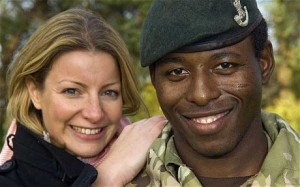As some regular readers may understand, I’m possibly not the best person around here to comment on religion, but, as I’ve mentioned before, the belief by some ecumenical sorts that all expressions of faith are, as expressions of “spirituality” (whatever that may mean), equally worthy of respect, is not an idea that should go unchallenged.
This story from the Daily Telegraph is an extreme case, but it makes that point. It is also a thoroughly good story in every sense of the word.
At just after 1.30pm on Thursday, Paul Apowida, a soldier with 1st Battalion The Rifles, marched on to the parade ground at Beachley Barracks, near Chepstow, to receive a campaign medal for his service in Afghanistan. Fresh off the plane from Helmand province where, as point man, he had led his fellow riflemen across some of the country’s most treacherous terrain, Apowida was wearing his Army fatigues and a green beret, proudly displaying the cap badge of the battalion. Not required – after a six-month-long tour – were three other things that had kept him safe: body armour, his rosary beads and his Bible.
“I took my rosary with me every time I went out on patrol,” he says when we met after the ceremony. “My rosary, my Bible and a picture of Jesus in my helmet. And, every time, at the end of a patrol, I thanked God for bringing me and my mates back safely.”
There are many brave soldiers serving in Afghanistan, but few have a background as unusual as Apowida’s. Born in a remote village in the semi-arid scrubland of northern Ghana, Apowida’s father died before he was born. When his mother died shortly after giving birth, the baby was considered cursed, deemed a “spirit child” – a child possessed by evil spirits who would bring misfortune on the entire community – and condemned to death by a soothsayer who instructed Apowida’s stepmother to feed him poisonous herbs. The belief in “spirit children” has a long, dark history in Ghana and, although there are no official statistics, is thought to have led to thousands of deaths.
But Apowida was rescued by a Catholic nun, Sister Jane Naaglosegme, who had been posted to his village to start a care home for “spirit children”. She nursed him back to health – he had already swallowed the herbs, but they had not proved fatal – and, eventually, after two further attempts on Apowida’s life, she sent him to a boarding school 800 miles away, in Tema, just outside the capital, Accra.
Not a natural scholar, he struggled in his classes but then went to art college, where he flourished.It was at this time, also, that he became the beneficiary of a new charity, AfriKids, set up in 2002 by a young, idealistic woman in her early twenties called Georgie Cohen (now Georgie Fienberg). Fienberg, who had worked with Sister Jane during a gap year in West Africa, had got to know Apowida on her regular trips back to Ghana and funded him through art college. In his last year of college, Apowida said that his mother had come to him in a dream and told him he should join the British Army. Britain – in the form of AfriKids – had done so much for him, she told him, that he should join to show his gratitude.
Fienberg agreed to become his legal guardian, and he moved to London, where he attended sessions run by British Military Fitness. He joined The Rifles in 2008.
Well, thank you Paul Apowida. And thank you Sister Naaglosegme, Georgie Fienberg — and Afrikids.

